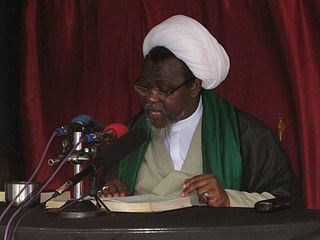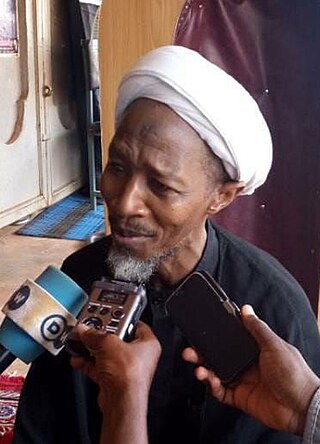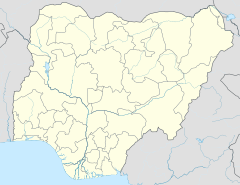
Kaduna State is a state in the northwest geopolitical zone of Nigeria. The state capital is its namesake, the city of Kaduna, which was the 8th largest city in the country as of 2006. Created in 1967 as North-Central State, which also encompassed the modern Katsina State, Kaduna State achieved its current borders in 1987. Kaduna State is the fourth largest and third most populous state in the country, Kaduna State is nicknamed the Centre of Learning, owing to the presence of numerous educational institutions of importance within the state such as Ahmadu Bello University.

Zaria is a metropolitan city in Nigeria which lies within four local government areas in Kaduna State; it is the capital city to the Zazzau Emirate Council, and one of the original seven Hausa city-states and a major city in the state. The local government areas that made up of the city of Zaria includes: Zaria Local Government, Sabon Gari Local Government, Giwa Local Government and Soba Local Government areas in Kaduna state, Nigeria.
After the death of Muhammad in 632, a group of Muslims, who would come to be known as the Sunnis, believed that Muhammad's successor as caliph of the Islamic community should be Abu Bakr, whereas a second group of Muslims, who would come to be known as the Shias, believed that his successor should have been Ali ibn Abi Talib. This dispute spread across various parts of the Muslim world, which eventually led to the Battle of Jamal and Battle of Siffin. Sectarianism based on this historic dispute intensified greatly after the Battle of Karbala, in which Husayn ibn Ali and some of his close partisans, including members and children of Muhammad's household, were killed by the ruling Umayyad Caliph Yazid I, and the outcry for revenge divided the early Islamic community, albeit disproportionately, into two groups, the Sunni and the Shia. This is known today as the Islamic schism.
Although the majority of the Nigerian Muslim population is Sunni, there is a small Shia minority, particularly in the northern states of Kano and Sokoto. However, there are no actual statistics that reflect a Shia population in Nigeria, and a figure of even 5% of the total Nigerian Muslim population is thought to be too high “because of the routine conflation of Shi’a with Sunnis who express solidarity with the Iranian revolutionary program, such as those of Zakzaky’s Ikhwani.”
The Islamic Movement of Nigeria is a banned Shia religious organization which aims to establish an Islamic state in Nigeria. It was founded by Ibrahim Zakzaky, who was inspired by the Iranian Revolution and rejects the authority of the Nigerian Government. The movement focuses on a nonviolent approach toward achieving an Islamic State, which has established some legitimacy as an alternative government. The IMN is headquartered at the spiritual center, Husainiyya Baqiyatullah, in Zaria with the group's numbers estimated around 5% of Nigerias Muslim population of 100 million. While the main focus of the group is Islamic studies and enlightenment, Zakzaky has also encouraged his followers to pursue Western education and engage in charity work. Currently, the leader of the movement, Zakzaky, was in jail recently, and the group organized protests for his release that have resulted in conflict with the Government.

Ibraheem Yaqoub El-Zakzaky is a Nigerian religious leader. An outspoken and prominent Shi'a leader in Nigeria, he has been imprisoned several times for his struggle against what he sees as injustice, especially the system of corruption in his country. Zakzaky claims that only Islam can offer solution to the complex socio-political problems facing Nigeria, which has over the years stagnated the country's development. In a lecture he has delivered in marking the occasion of Sheikh Uthman Bn Fodio Week organized by the Academic Forum of Islamic Movement, Zakzaky stated that he is continuing the Jihad of Uthman Bn Fodio to make sure that Islam becomes the ruling religion in not only Nigeria but the entirety of West Africa. In a lecture he delivered on the same occasion in Sokoko, one of his proponents, Dr. Nasir Hashim has claimed that Zakzaky’s dream is the only hope for Africa.
Shia Islam in Africa is the continent's second most widely professed sect of Islam behind Sunni Islam.
Idris Garba was the Military Governor of Benue State from 1987 to 1988 and Governor of Kano State from 1989 to 1992.
Garba Ali Mohammed was Military Administrator of Niger State in Nigeria from 1986 to December 1987 during the military regime of General Ibrahim Babangida.
Religion in Kaduna State is a secular state, with Christian, Muslim and some indigenous religious adherents. The Sharia is valid for the areas with a mainly Muslim population. The leader of the Sufi Tijaniyyah brotherhood is Sheikh Dahiru Usman, and Sheikh Ibraheem Zakzaky is the leader of the Shia Islamic Movement in Nigeria.

Anti-Shi'ism is hatred of, prejudice against, discrimination against, persecution of, and violence against Shia Muslims because of their religious beliefs, traditions, and cultural heritage. The term was first used by Shia Rights Watch in 2011, but it has been used in informal research and written in scholarly articles for decades.
Religious violence in Nigeria refers to Christian-Muslim strife in modern Nigeria, which can be traced back to 1953. Today, religious violence in Nigeria is dominated by the Boko Haram insurgency, which aims to establish an Islamic state in Nigeria. Since the turn of the 21st century, 62,000 Nigerian Christians have been killed by the terrorist group Boko Haram, Fulani herdsmen and other groups. The killings have been referred to as a silent genocide.
Zaria Quds massacres refers to an incident on July 25, 2014, when the Nigerian Army opened fire on members of the Islamic Movement who were taking part in Quds day rallies, and killed 35 people, including three sons of Ibrahim Zakzaky, leader of the movement. The Islamic Movement and Islamic human rights groups have claimed that Nigerian government's close ties with Israel were responsible for the attacks on the pro-Palestinian group.
Shia Muslims have been persecuted by the Islamic State, an Islamic extremist group, since 2014. Persecutions have taken place in Iraq, Syria, and other parts of the world.

Qasim Umar Sokoto was a contributor to the Islamic Movement of Nigeria, the prayer leader and Islamic teacher in Sokoto, the Northern city of Nigeria.

The Presidential Guards Brigade is an elite brigade of the Nigerian Army responsible for protecting the President of Nigeria. The members of the brigade are a group of Nigerian soldiers who guard the residence of the President and his guests, as well as perform ceremonial duties. Also referred to as the Brigade of Guards, this unit, according to AllAfrica with reference to a senior army official, "does not answer to Army Headquarters or to the Chief of Army Staff in any operational matters and its commander is completely integrated into the President's security team."

On the night of 20 October 2020, at about 6:50 p.m., members of the Nigerian Army opened fire on unarmed End SARS protesters at the Lekki toll gate in Lagos State, Nigeria. Amnesty International stated that at least 12 protesters were killed during the shooting. A day after the incident, on 21 October, the governor of Lagos State, Babajide Sanwo-olu, initially denied reports of any loss of lives, but later admitted in an interview with a CNN journalist that "only two persons were killed".
Ahmadu Bello UniversityZaria is a federal government research university located in Zaria, Kaduna State, Nigeria, opened in 1962 as the University of Northern Nigeria. It was founded by and is now named for Ahmadu Bello, the first premier of Northern Nigeria.







